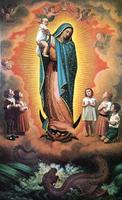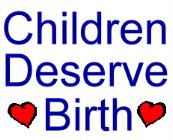The Fundamental Reproductive Right Is the Right to Be Born
Catholic Doctors on a Disabilities Treaty
Here is a statement regarding the International Treaty on Disabilities given to the U.N. General Assembly by the International Federation of Catholic Medical Associations..
Mr. Chairman, the World Federation of Catholic Medical Associations, FIAMC, is the premier organization of Roman Catholic physicians in clinical practice, research, teaching and bioethics.
The FIAMC supports all efforts to ease both the suffering of the disabled and the medical, social and proximate causes of disability. The good purpose of this work should never be moved by a false sentimentality to remove the victim rather than the causes. Mr. Chairman, we respectfully disagree that the treaty does not articulate new rights. With respect to Article 25a and reproductive rights it is not a question of new rights but new possibilities by new technologies. We have, for example, the ability to study the 3-day-old embryo for chromosomal translocations or polysomy, marking these for termination.
We agree with the Holy See delegation, while this is a convention on rights and disabilities, reproductive rights is a wide open term (and a contradiction). The law is not dispositive here, rather the defining reality is medical and biological, and reproductive rights will continue to expand as technology provides.
Accordingly, the FIAMC delegation opposes any linkage of reproductive rights, so called, to the prevention, treatment or politization of disabilities. Likewise FIAMC opposes any and all definitions of pregnancy which would link it to maternal disability. The fundamental reproductive right is the right to be born. Life itself is the preeminent good beyond any contingencies or circumstances for "He made all things that they may have being" (Wisdom 1:14).
Particular concern is raised against any intra or extra utero screening be used to mark new human beings for termination. This is a heinous offense against humanity, the new life, and all of those disabled living heroically and joyfully, even in suffering, and those who with compassion and love care for them. All of these techniques and interventions are to be used on behalf of new life, not its frustration.
A society which seeks to reduce suffering by abortion or by euthanasia of a disabled newborn, or at any time thereafter, will devour itself. In truth the human condition ultimately finds each and every one of us disabled, physically, emotionally or psychologically.
We must first preserve and then serve the lives of "the least in ability" because neither life nor love, or usefulness and purpose are denied in disability.
Joseph Mauceri Delegate FIAMC United Nations, New York Endorsed by President of FIAMC, José-Maria Simon
AUG. 20, 2006
Source: http://www.zenit.org/english/visualizza.phtml?sid=93512
Catholic Doctors on a Disabilities Treaty
Here is a statement regarding the International Treaty on Disabilities given to the U.N. General Assembly by the International Federation of Catholic Medical Associations..
Mr. Chairman, the World Federation of Catholic Medical Associations, FIAMC, is the premier organization of Roman Catholic physicians in clinical practice, research, teaching and bioethics.
The FIAMC supports all efforts to ease both the suffering of the disabled and the medical, social and proximate causes of disability. The good purpose of this work should never be moved by a false sentimentality to remove the victim rather than the causes. Mr. Chairman, we respectfully disagree that the treaty does not articulate new rights. With respect to Article 25a and reproductive rights it is not a question of new rights but new possibilities by new technologies. We have, for example, the ability to study the 3-day-old embryo for chromosomal translocations or polysomy, marking these for termination.
We agree with the Holy See delegation, while this is a convention on rights and disabilities, reproductive rights is a wide open term (and a contradiction). The law is not dispositive here, rather the defining reality is medical and biological, and reproductive rights will continue to expand as technology provides.
Accordingly, the FIAMC delegation opposes any linkage of reproductive rights, so called, to the prevention, treatment or politization of disabilities. Likewise FIAMC opposes any and all definitions of pregnancy which would link it to maternal disability. The fundamental reproductive right is the right to be born. Life itself is the preeminent good beyond any contingencies or circumstances for "He made all things that they may have being" (Wisdom 1:14).
Particular concern is raised against any intra or extra utero screening be used to mark new human beings for termination. This is a heinous offense against humanity, the new life, and all of those disabled living heroically and joyfully, even in suffering, and those who with compassion and love care for them. All of these techniques and interventions are to be used on behalf of new life, not its frustration.
A society which seeks to reduce suffering by abortion or by euthanasia of a disabled newborn, or at any time thereafter, will devour itself. In truth the human condition ultimately finds each and every one of us disabled, physically, emotionally or psychologically.
We must first preserve and then serve the lives of "the least in ability" because neither life nor love, or usefulness and purpose are denied in disability.
Joseph Mauceri Delegate FIAMC United Nations, New York Endorsed by President of FIAMC, José-Maria Simon
AUG. 20, 2006
Source: http://www.zenit.org/english/visualizza.phtml?sid=93512




<< Home